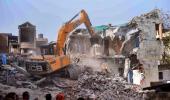'The act of demolition, for whatever reason, was far too hasty without even giving an opportunity of an appeal.'

The demolition by the Prayagraj Development Authority of student activist Afreen Fatima's home in Prayagraj on Sunday, June 12, has shocked civil society and like-minded people.
The Uttar Pradesh police alleges Afreen's father Javed Ahmed, a well-known activist in Prayagraj, is the alleged mastermind of the violence that took place following Friday prayers on June 10 in the city.
The violence broke out following protests against suspended Bharatiya Janata Party spokesperson Nupur Sharma over her derogatory remarks against Prophet Mohammed in a television debate last month.
In retaliation, the UP police arrested Javed Ahmed and later the Prayagraj Development Authority demolished his house.
The municipal authorities claimed the house was constructed 'illegally'. The house was not owned by Javed Ahmed, but by his wife Parveen Fatima.
That did not deter the Prayagraj Development Authority who demolished the house for alleged 'irregularities'.
Syed Firdaus Ashraf/Rediff.com asks former Supreme Court judge Justice Madan B Lokur if the Uttar Pradesh government was right in doing what it did and what the courts can do to prevent the misuse of the law by state governments.
It has now become routine for BJP governments to bulldoze protestors' homes without the due process of law being followed.
Is there no way civil society can stop this ongoing blatant misuse of State power against protestors?
On its own, civil society can do very little.
It needs the support of the judiciary and right-minded people in government and, of course, the media which can and must highlight excesses and not forget about them after a week.
The municipal authorities claim the house was illegal and violated Prayagraj Development Authority rules.
The local municipality claims there is no connection between Javed Ahmed's alleged role in the June 10 protests and the demolition and that the house was demolished as it was illegal.
Can we believe such narratives from the government?
The act of demolition, for whatever reason, was far too hasty without even giving an opportunity of an appeal.
Therefore, the act is most unfair and unjust.
As far as excuses are concerned, it is increasingly becoming difficult to believe whatever the government says.
The house was in the name of Javed Ahmed's wife who had nothing to do with the protests, and still the house was demolished.
Prayagraj municipal authorities are showing backdated letters stating that it served notices on the family in May, but no one turned up for the hearing.
Even considering there is an iota of truth in this, does it give the right to any authority to demolish homes?
As already mentioned, it is difficult to accept whatever the government says at face value.
Officials in the UP police have been known to fabricate documents as held in a recent decision of the Delhi high court.
Other officials are also capable of fabricating documents./p>
The house was demolished on a Sunday and that too at a time when family members were detained by the police.
Authorities say there is no rule which states that illegal homes cannot be demolished on Sundays.
Does it show that the government's only motive was to go ahead with the demolition because it did not want the family to go to court on Monday against the demolition?
This looks more than likely.
It's an old trick -- arresting a person on Saturday so that he cannot get bail on a Sunday.
Is there any provision of law that empowers the local authority or the government to take such summary action against an accused person's property?
Certainly not without providing for an appeal.
Doesn't such action overturn the legal axiom 'innocent till proven guilty', which is the bedrock of our judicial system?
I think we should get the full facts first.
It appears from the available material that the UP authorities have taken the view that the 'accused' are guilty and there is no need for them to prove their innocence.
To this extent the axiom has been jettisoned.
The government claims illegal weapons and objectionable posters were recovered from the house. Is that good enough reason to demolish the house?
Frankly, I don't buy the story now being put out by the government.
The 'accused' is obviously not so stupid as to leave a weapon behind.
Madhya Pradesh Home Minister Narottam Mishra had stated earlier, 'Jis ghar se patthar aaye hain, us ghar ko pattharon ka hi ghar banayenge' (whichever houses were involved in stone pelting, we will turn into piles of stones).
While I am against violence, I don't think violence should be met with violence, certainly not by the State.
'Baba Bulldozer' was the electoral narrative set by Uttar Pradesh Chief Minister Yogi Adityanath who won the 2022 UP elections. In this scenario, will we ever return to the old ways because now it seems that voters of UP have given their stamp of approval for such acts. Isn't it?
I don't think we will return to normalcy in a hurry.
Can the courts take suo motu action and stop such demolitions?
Constitutional courts can take suo motu action and I think they should.
Questions are being raised about the role of the courts when government authorities have become judge, jury and executioner.
If we want to live in a democracy, we must have courts.
What has gone wrong with Indian society? Are are we yet to see the worst?
Difficult to say when the last straw will break the camel's back.











 © 2025
© 2025